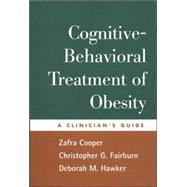The first cognitive-behavioral treatment manual for obesity, this volume presents an innovative therapeutic model currently being evaluated in controlled research at Oxford University. From leading clinical researchers, the approach is specifically designed to overcome a major weakness of existing therapies: posttreatment weight regain. The book details powerful ways to help patients not only to achieve weight loss, but also to modify the problematic cognitions that undermine long-term weight control. Drawing on strategies proven effective with such problems as binge eating, the manual contains everything needed to implement the treatment: intervention guidelines, case examples, and reproducible handouts and forms.








